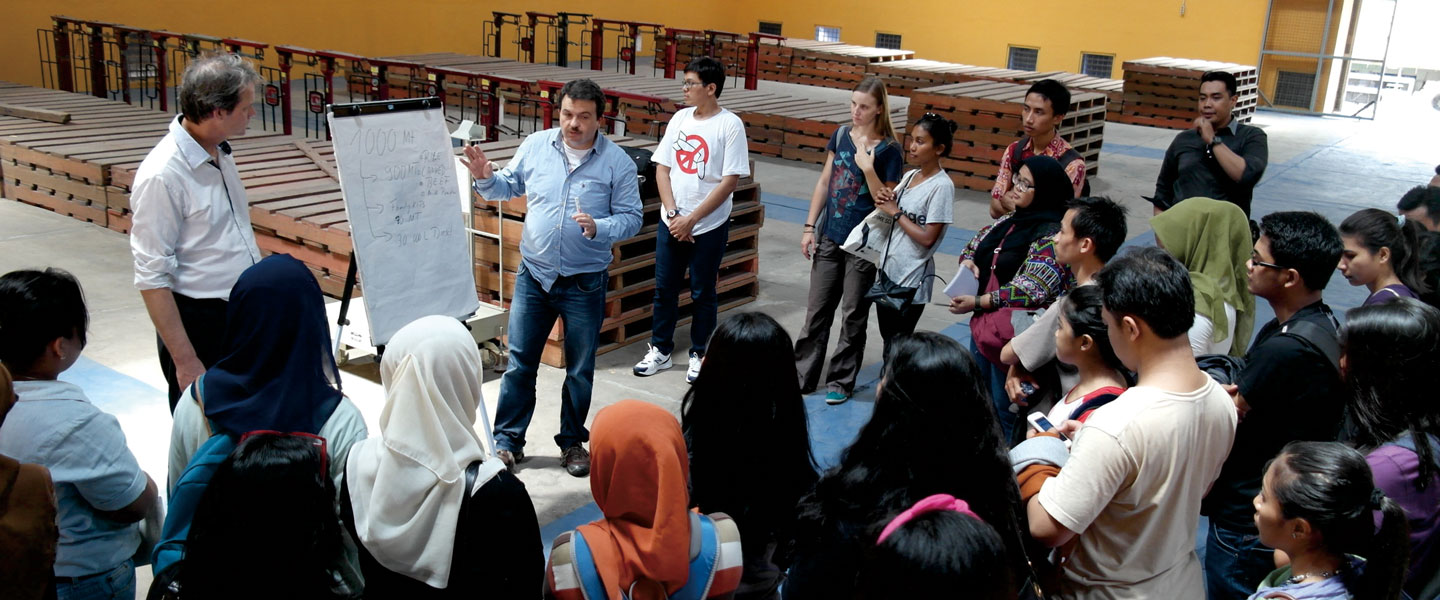
NOHA academics and renowned speakers from Indonesia and other Asian countries will address the trials of humanitarian supply chain management and logistics, including decision making, chain components, performance management, networking design, procurement and warehousing, communication and security, relations with the military, table top exercise emergency management, as well as the social dimensions of delivery systems. Elucidation through various case studies occurs throughout the week. Also, regional Asian perspectives and experiences will receive special attention.

Humanitarian supply chain management (SCM) is defined by the IFRC as ‘acquiring and delivering requested supplies and services at the places and times they are needed, whilst ensuring best value for money; in the immediate aftermath of any [type of] disaster or reconstruction situation, including items that are vital for survival, such as food, water, temporary shelter and medicine’. Humanitarian Logistics is part and parcel of the wider humanitarian SCM.
Recent research has shown a need for multi-dimensional understanding of humanitarian SCM. Both from a technical perspective (logistics, information gathering, warehousing, pre-positioning, transportation, distribution) as well as from a strategic perspective (decision making, co-ordination, inter-organisational co-operation, public-private partnerships, contribution to long-term recovery through knowledge transfer) conceptualisation and field-sustained research has been conducted for the benefit of producing deeper knowledge of global humanitarian SCM.
With an estimated 22 billion USD spent in 2013 on humanitarian aid (GHA report 2014; calculations based on both public as well as private spending) in response to natural disasters and complex emergencies one can easily see the need for professional and efficient humanitarian SCM, which is involved in 80% of all relief activities.
Asia and South-East Asia over the past decade have become increasingly prone to especially natural disasters. Be it because of climate change, man-made interference with nature or ‘simple’ geological circumstances, more frequently hazards have materialized into disasters, affecting the lives of millions and demanding increasing national and international humanitarian response. Indonesia is certainly an example in kind. From Tsunami’s to earthquakes, landslides, volcano eruptions and flooding, the vulnerability of the Indonesian population is quite high.
Over the past decade international humanitarian aid to Indonesia amounted to 242 million USD annually on average, leaving aside the sizeable amounts the Indonesian government spent on disaster response, risk reduction and preparedness. Given the size of the country, the state of its infrastructure and therefore issues of accessibility, proper attention to humanitarian logistics has been of prime importance. An interesting development here is the growing role of ASEAN´s AHA Centre, the coordinating centre for humanitarian assistance on disaster management.
Located in Jakarta, the AHA Centre progressively facilitates co-operation and co-ordination among the parties involved in disaster situations, and promotes regional collaboration with relevant United Nations and international organizations. Especially in the field of humanitarian logistics ASEAN´s AHA Centre has rapidly become a factor of influence over the past years.
Already for a period of eight years NOHA AISBL has worked ever more closely together with Universitas Gadjah Mada, Yogyakarta, Republic of Indonesia. Thanks to the Directorate General Humanitarian Aid and Civil Protection and the Directorate General Education and Culture (Erasmus Mundus), both European Commission, as well as the European NOHA Universities this cooperation blossoms. The deepening relationship has resulted in dozens of staff and student exchanges, in thesis research being accompanied by UGM professors in situ and in collaboration towards joint doctorate research. By co-jointly organizing a high profile summer school NOHA and UGM set the next step to an activities-based relationship - as dictated by NOHA’s global strategy - aimed for increased academic humanitarian research and aimed at contemporary relevance for humanitarian practice.
The University of Groningen have been mandated by the NOHA Board of Directors to organize this school together with UGM, its scholars from various faculties, the Programme on Humanitarian Action (POHA) and its International Office. The target audience constitutes a mix of students, academics, officials and practitioners; familiar as well as unfamiliar with the subject, both from Indonesia itself, the larger Asia region and from international organisations.
The main academic staff from the Universitas Gadjah Mada involved are: Prof Dr Agus Wilopo Siswanto, Dr Muhadi Sugiono, Jaka Triyaka MA, LLM and Dr Juhri Agriawan (UGM Pustral). Also involved are Dr M Sunardi (Director BNPB Indonesia), Colonel Riza Yasma (TNI Indonesia) and Dr Ratih Kusumastuti (University of Indonesia, Jakarta). The main NOHA staff involved are Andreas Kling MA (University of Bochum, Germany), and Prof Dr Joost Herman (President NOHA; Director NOHA University of Groningen, The Netherlands). Envisaged guest speakers will include the Asean’s Humanitarian Aid Office, the DG Humanitarian Aid’s Regional Support Office Bangkok, the Centre for Humanitarian Action from University College Dublin and representatives from the private sector.
NOHA-UGM expects participants to acquire:
This site uses cookies to enhance user experience and to track usage statistics. For more information, see NOHA’s Data Privacy Policy.